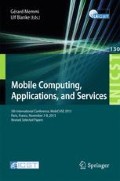Abstract
This paper discusses the use of evolutionary algorithms in mobile computing in order to provide individuals with aphasia a means of self-guided and unsupervised speech and language therapy. Traditional speech and language therapy approaches necessitate significant time commitments and are resource intensive. By harnessing evolutionary computation, therapy sessions can be generated, which consider the best practices of a speech and language professional whilst factoring in the abilities and idiosyncrasies of the user. The primary goal of this research is the provision of a self-directed rehabilitative application targeted at aphasic individuals with writing difficulties (particularly dysgraphia).
Access this chapter
Tax calculation will be finalised at checkout
Purchases are for personal use only
Preview
Unable to display preview. Download preview PDF.
References
van de Sandt-Koenderman, W.M.E.: Aphasia rehabilitation and the role of computer technology: Can we keep up with modern times? Int. J. Speech Lang. Pathol. 13, 21–27 (2011)
Greig, C.-A., Harper, R., Hirst, T., Howe, T., Davidson, B.: Barriers and Facilitators to Mobile Phone Use for People with Aphasia. Topics in Stroke Rehabilitation 15, 307–324 (2008)
Katz, R.C.: Computers in the treatment of chronic aphasia. Semin. Speech Lang. 31, 34–41 (2010)
Cherney, L., Halper, A.: Novel Technology for Treating Individuals with Aphasia and Concomitant Cognitive Deficits. Topics in Stroke Rehabilitation 15, 542–554 (2008)
Marshall, J., Pound, C., White-thomson, M., Pring, T.: The use of picture/word matching tasks to assist word retrieval in aphasic patients. Aphasiology 4, 167–184 (1990)
Nettleton, J., Lesser, R.: Therapy for naming difficulties in aphasia: Application of a cognitive neuropsychological model. Journal of Neurolinguistics 6, 139–157 (1991)
Boyle, M., Coehlo, C.A.: Application of Semantic Feature Analysis as a Treatment for Aphasic Dysnomia, http://aphasiology.pitt.edu/archive/00000227/
Maher, L.M., Clayton, M.C., Barrett, A.M., Schober-Peterson, D., Gonzalez Rothi, L.J.: Rehabilitation of a case of pure alexia: exploiting residual abilities. J. Int. Neuropsychol. Soc. 4, 636–647 (1998)
Francis, R.D., Riddoch, M.J., Humphreys, G.W.: Treating agnosic alexia complicated by additional impairments. Neuropsychological Rehabiltation 11, 113–145 (2001)
Beeson, P.M., Hirsch, F.M., Rewega, M.A.: Successful single-word writing treatment: Experimental analyses of four cases. Aphasiology 16, 473–491 (2002)
Luzzatti, C., Colombo, C., Frustaci, M., Vitolo, F.: Rehabilitation of spelling along the sub-word-level routine. Neuropsychological Rehabilitation 10, 249–278 (2000)
Beeson, P.M.: Treating acquired writing impairment: strengthening graphemic representations. Aphasiology 13, 767–785 (1999)
Princeton University “About WordNet.” WordNet, Princeton University (2010), http://wordnet.princeton.edu
Author information
Authors and Affiliations
Editor information
Editors and Affiliations
Rights and permissions
Copyright information
© 2014 ICST Institute for Computer Science, Social Informatics and Telecommunications Engineering
About this paper
Cite this paper
Higgins, C., Kearns, A., Ryan, C., Fernstrom, M., Franklin, S. (2014). Towards Unsupervised Remote Therapy for Individuals with Aphasia. In: Memmi, G., Blanke, U. (eds) Mobile Computing, Applications, and Services. MobiCASE 2013. Lecture Notes of the Institute for Computer Sciences, Social Informatics and Telecommunications Engineering, vol 130. Springer, Cham. https://doi.org/10.1007/978-3-319-05452-0_20
Download citation
DOI: https://doi.org/10.1007/978-3-319-05452-0_20
Publisher Name: Springer, Cham
Print ISBN: 978-3-319-05451-3
Online ISBN: 978-3-319-05452-0
eBook Packages: Computer ScienceComputer Science (R0)

